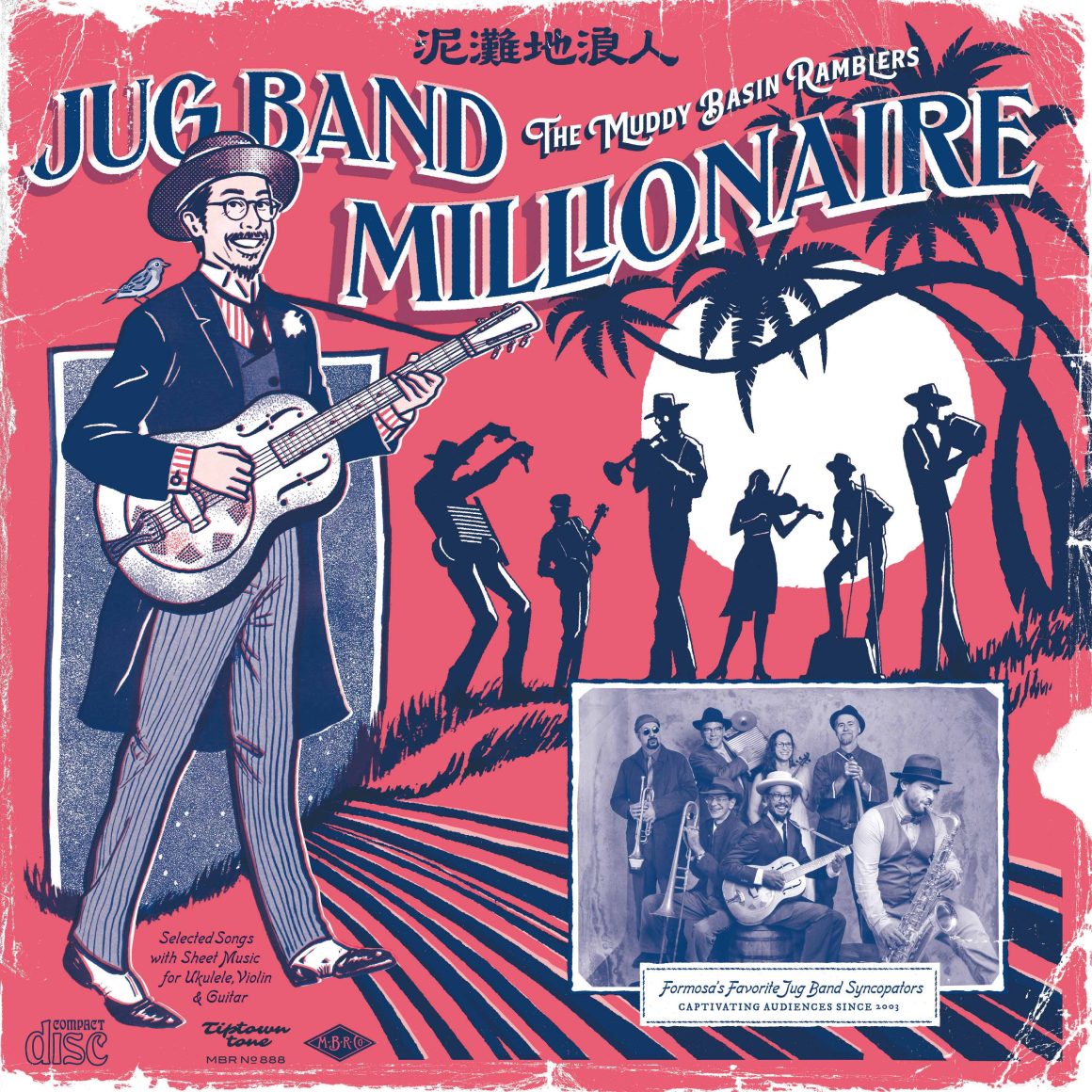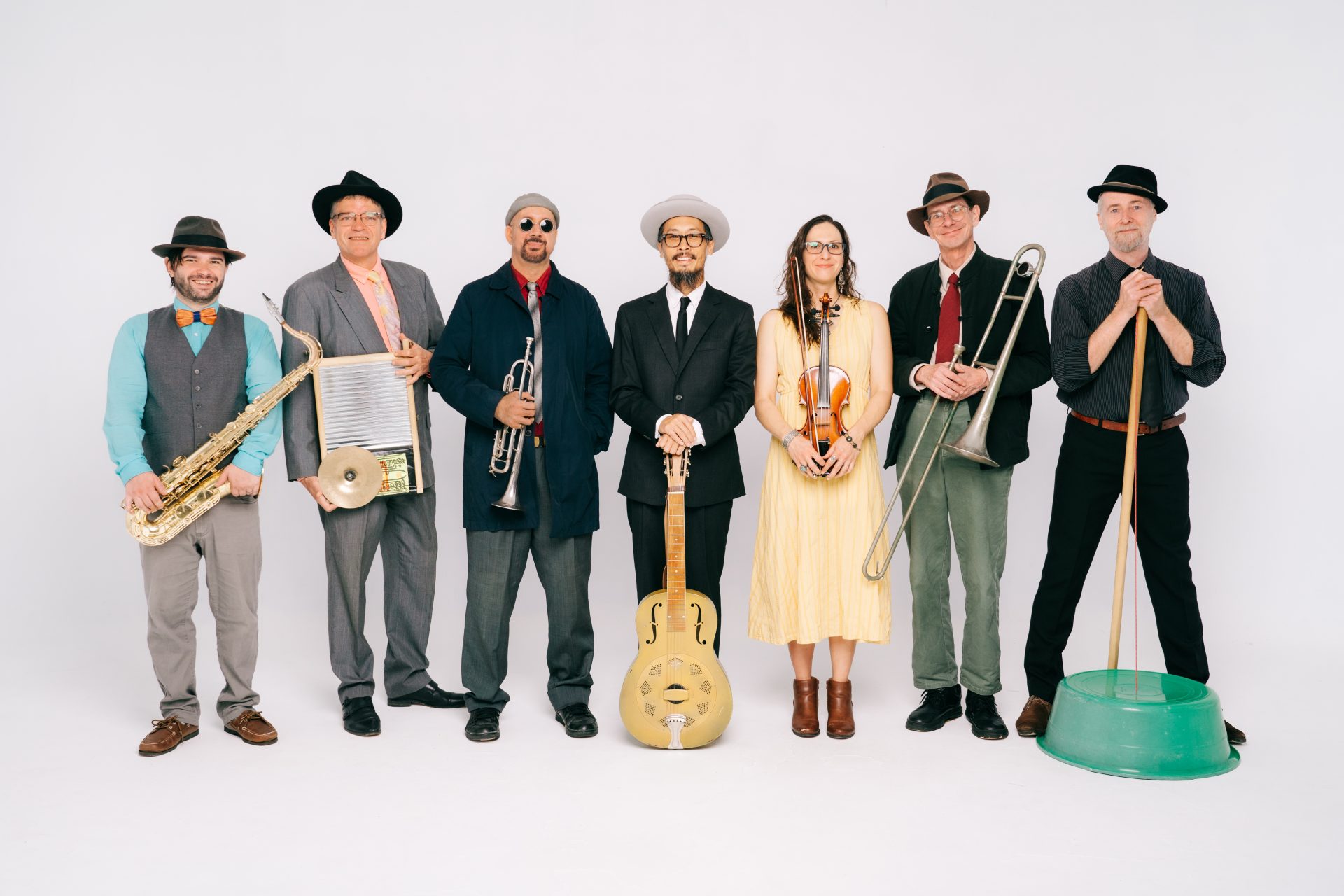Author Cat Thomas
Photographer Aenbi Kuo, courtesy of the Muddy Basin Ramblers
The Muddy Basin Ramblers, Taiwan’s best-loved jug band, released their fifth album in January this year. Taiwan Scene.com caught up with band leader David Chen to learn more about the history of the band, their musical philosophy, and their favorite venues to play in Taiwan.

Back in the early 2000s, David Chen started hanging out with three musician friends, Conor Prunty, Will “Slim” Thelin, and Tim Hogan, going into “Taipei’s lovely outdoor spaces” such as parks and the Bitan riverside to get together and play. At that time the four-person line up used guitar, harmonica, the wash tub bass, and tap dancing.
In 2003, this led to the official formation of the Muddy Basin Ramblers (the ‘muddy basin’ refers to Taipei’s geographic properties of being nestled between surrounding mountain ranges, with frequent rainfall). Traditionally, as the latest album’s sleeve notes observe, jug bands use homemade instruments such as empty jugs, washboards for percussion, washtub bass, and kazoos blended with conventional instruments such as violin, banjo, guitar, piano, and harmonica.
Over the intervening years, the line up has featured all of these, taking advantage of “whoever is around and fits into the band,” as Chen puts it, to create their unique sound. This pattern of co-opting members has led to their five albums each having a distinct style.

“That’s part of the fun of it,” said Chen “Over the years, we’ve had that variety of sounds. And so it really just depends on serendipity. Who’s there at the time? What works? What are we feeling at this time?”
Currently made up of US and UK expatriates who have made Taiwan their home, the latest album, Jug Band Millionaire, which was released on Jan 31, has extensive sleeve notes about the forefathers of jug band music and the cultural heritage, described as ‘the fun and down-to-earth musical artform innovated by African-American folk, blues and jazz musicians of the 1920s and 1930s.’
The majority of the tracks are rearrangements of these classics and the remarkable 33-page sleeve notes, designed by Onion Deign Associates – a long standing collaboration that has resulted in two prior Grammy-nominations for best packaging – also include sheet music for selected tracks, which, as Chen observed, was how music was largely shared before records came along. Vintage-inspired artwork and ‘ads’ complete this bilingual cultural bonanza.
Currently, the band has a seven-person1 line-up that mixes stringed and brass instruments with the members switching instruments from track to track. Of course, with so many members, finding the time to practice, jam, and record can be challenging.

In keeping with the jug band style, gigs play an important role in their developing sound. “There’s two kinds of gigs,” said Chen. “The kind of gigs that we use to practice and the kind of gigs which we have to practice for. So, the former are much more relaxed gigs. The ones that we play at pubs, or the ones we used to play in Bitan. That was just our way to have a quick audience and test out material.”
When it comes to creating an album, these gigs mean that the songs are already pretty well-rehearsed and just need to be reworked to fit into the album. The recording for Jug Band Millionaire was done at three sites, Taipei’s Yucheng studios(台北玉成戲院錄音室), a former movie theater converted into a high-tech studio space, Chez Paradise (Cristina and Zach’s house), and by the side of a hiking path in Yangmingshan on a hot summer evening, accompanied by a “lovely drizzling rain”.

These venues were chosen in the spirit of the original homes to the style of music. The informal living room, formal studio, and outdoors.
“Certain songs needed a relaxed atmosphere,” observed Chen. “And some of them required us to actually concentrate and be at our best, and that was where the studio [came in]. The atmosphere in the feeling of the space is that everybody takes it seriously. You’re totally focused on it… it’s like a temple of music, you know, we had fun but we concentrated a lot.”
So, after releasing four albums of largely original Taiwan-focused material what led the band towards taking the classics and running with those?
“I think it was just the right thing to do at this time,” said Chen. “When you do it this long, you need to kind of renew your charge, your creative batteries, and this is a way to do it. It’s also good to remind yourself how we got here … They’re just so much fun. That’s the whole thing about it. We just wanted to have fun and get in touch with the roots.”
The album also features CD-only bonus track of “Four Seasons of Red(四季紅)”, a classic underground Taiwanese song from 1938. The hybrid style of Caribbean string band music and rocksteady creates a reggae-infused vibe with lead vocals by Golden Melody Award winning singer Lo Sirong.
“It fits because it’s island music and I feel like a lot of Taiwanese music actually has reggae hidden inside,” said Chen. “When I heard [the original version], I thought, oh boy, this is right up our alley because it uses similar instruments. There are banjos(斑鳩琴) in there… Let’s make it into a Muddy Basin Ramblers song.”
With the two-decades plus of rip-roaring shows the Muddy Basin Ramblers have played in spaces ranging from Taipei 101 to temples, indoor and outdoor festivals, historic buildings, and classical music venues. Asked about the favorite Ramblers venue Chen is quick to reply.
“My favorite venue is where everybody’s there listening and connecting. We’ve had amazing gigs where we’re playing just in someone’s yard. And we’ve played at the national concert hall recital hall. That’s more about a large-scale formal event where everything’s planned. That was fantastic. “So, it doesn’t matter where we play. It’s really about the energy.”
Chen is particularly fond of the one-mic set up that they used at the raucous album launch party in January.
“It’s simple to set up. You don’t have to spend so much time doing sound check, but it’s also it’s really fun … when you crowd around a mic,” said Chen. “You have to make sure you don’t hit somebody which is very interesting, a very real risk. So, it’s fun, it’s sort of invigorating.”
So, with all his experience of performing and attending gigs in Taipei, what are the venues one should go to to check out the live music scene? Chen recommends that people head to Revolver or Pipe for Indie rock, or The Wall often has hip hop shows, Sappho for live jazz, stalwarts the Witch House and Oldie Goodie, and occasionally mixed-performance arts venue The UU Mouth.
With a small but vibrant live music scene Chen agrees that you’ll most likely be able to find something to suit your tastes on any given weeknight. And to keep it that way, Chen said, “It’s important to support those places.”
Looking forward to the rest of the year, Chen hopes that the band can play more shows outside Taipei, getting down to Tainan and Taichung and band favorite Taidong. Here’s to many more years of the Muddy Basin Ramblers getting their audiences up and dancing with their rousing shows both in Taiwan and beyond.
The Muddy Basin Ramblers’ albums are available to buy at local record and book shops, or through books.com.tw or outside Taiwan at Bandcamp. To keep up to date with the latest shows and band news follow the band on Facebook or Instagram.
- The Muddy Basin Ramblers are:
1. David Chen, originally from Chillicothe, Ohio, lead vocals, guitars, mandolin, banjo
2. Tim Hogan, of California, washboard, snare drum and percussion, vocals
3. TC Lin, originally from the US but now a proud Taiwanese citizen, washtub bass, baritone, trumpet, tuba, vocals
4. Cristina Paradise, of Scranton, PA, violin, mandolin, various wind instruments, washtub bass, vocals
5. Zach Paradise, of Scranton, PA, guitars, banjo, ukulele, whistles, saxophone, ukulele, washtub bass, vocals
6. Conor Prunty, of London, England, harmonica, washtub bass, guitars, banjo, ukulele
7. Will “Slim” Thelin, from Omaha, Nebraska, jug, kazoos, trombone, lead vocals. ↩︎












